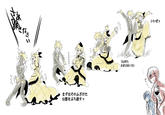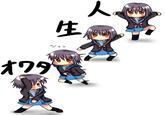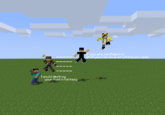My Life Is Over
Confirmed 66,129
Part of a series on Emoticons. [View Related Entries]
My Life Is Over
Part of a series on Emoticons. [View Related Entries]

| Navigation |
| About • Origin • Spread • Notable Derivatives • Search Interest • External References • Recent Images • Recent Videos |
About
My Life Is Over\(^o^)/ (Japanese: 人生オワタ\(^o^)/ or 人生\(^o^)/オワタ, Jinsei Owata), also translated as "It's so hopeless," is a Japanese one-line Shift-JIS art expressing profound desperation in one's life. In contrast to its quite happy looking facial expression, the emoticon is colored by a very negative image throughout its way of use in the Japanese anonymous text board community 2channel since the mid-2000s.
Origin
This Shift-JIS art of a person smiling with holding up both arms, "\(^o^)/", has been used for expressing one's joy in young girls texting since the end of 90s. And this simple Shift-JIS had been also used in the same positive meaning among online communities though its use frequency was very occasional compared to 2channel Shift-JIS arts represented by Monā and Giko. A 2channel's thread known for the first instance including "\(^o^)/" in its title was posted on /game/ board on November 25th, 1999.[1] It was used to express a submitter's pure love to Aya Hasebe, a character from a Japanese adult game Comic Party.[2]
Meanwhile, it was in the late 2005 when "\(^o^)/" began to be utilized in a quite bad meaning in 2channel. Users in that anonymous textboard community reinterpreted that innocent smile as an expression for profound despair of people who have no choice but to laugh with throwing up their hands, and associated it with the phrase "My Life Is Over" (人生オワタ, Jinsei Owata).

Large-Size Shift-JIS Art
Spread
Due to its ease of use, "My Life Is Over\(^o^)/" quickly spread on each boards in 2channel and the Shift-JIS art "\(^o^)/" itself established the status as an iconic character or emoticon for despair called "Jinsei Owata" or "Owata" simply. In a reflection of Owata's popularity on each boards, the series of threads for collecting the derivatives of Owata started on /gline/ board on November 12th of that year[3], and this series had been active till around 2008. Many Shift-JIS arts and flash animated videos for Owata are archived in web pages.[4][5]
In January 2007, a public service announcement by Japan Advertising Review Organization mistakenly caught a much attention among Japanese internet users because they used "\(^o^)/" in positive meaning.[6] This episode recursively shows the meaning of this Shift-JIS art had been completely overwritten by Owata at that point.

Good adverts.
It make me feel good.
Nowadays, Owata is used for expressing people's despair like "I failed an exam\(^o^)/", "I was jilted\(^o^)/" or "I blowed it at work\(^o^)/" even in Twitter and other social network services.
Notable Derivatives
The Big Adventure of Owata's Life
The Big Adventure of Owata's Life (人生オワタの大冒険, Jinsei Owata no Daibouken) refers to a freeware action game inspired by a popular thread series with the same name in /aastory/ (depicting long stories by Shift-JIS arts) board. That series began from a Shift-JIS art that Owata who despairs his life runs through many irrational traps to suicide himself in the sea of trees (樹海) or Aokigahara the suicide forest[7] but somehow gets trapped in the middle of the way and explodes with the well-known death sound effect in Mega Man, and the story of Owata's long journey is archived in fan-made pages.[8][9]

"Tiun Tiun Tiun"(ティウンティウンティウン) stands for the death sound effect
Based on this plot, this actually playable flash game was developed by a user called King (キング ◆KING75wl/Q). The first version of this Mega Man style action game was released to the public on January 1st, 2007[10], and it quickly got much popularity due to its extremely irrational difficulty.
The Big Adventure of Owata's Life the game is known as the father of subsequent famous extremely difficult freeware games I Wanna Be The Guy! and Syobon Action (Cat Mario).
I would destroy your fuck'n fantasy
"I would destroy your fuck'n fantasy" (そのふざけた幻想をぶち殺す, Sono Fuzaketa Gensou Wo Buchikorosu; abbr. そげぶ, SoGeBu) is a famous remark of Touma Kamijou, the protagonist in a Japanese light novel A Certain Magical Index. Used in combination with Owata's cool poses including the raging eagle pose, this loquacious speaker's high-flown language that is peculiar to light novels has been used in replies in 2channel.

Sogebu is also a popular subject for parody illustrations on illustrators communities pixiv[11] and Nico Nico Seiga.[12]





Turkish March Owata
"Turkish March Owata" (トルコ行進曲オワタ) is a Vocaloid song singing about "Owata" situations in ordinary life along with Wolfgang Amadeus Mozart's Piano Sonata No. 11, usually called as "Turkish March" in Japan. This song was posted to Nico Nico Douga (NND) by a user Garuna, better known as his alias Owata-P, on April 12th, 2008[13]. This song is famous as one of the hit songs in the early days of the Vocaloid phenomena.
Hand-drawn animated music video by fan[14]
Search Interest
External References
Editor’s Note: Registration is needed to browse the original videos listed in this section.
[1] 2ch.net – 長谷部彩ちゃああん!!\(^o^)/ / Posted on 11-25-1999 (Internet Archive, Japanese)
[2] Wikipedia – Comic Party
[3] 2channel – 人生オワタ\(^o^)/のガイドライン / Posted on 11-12-2005 (Japanese)
[4] 人生オワタ\(^o^)/ (Japanese)
[5] \(^o^)/オワタ堂 (flash archives, Japanese)
[6] New Akiba.com – JAROが「人生\(^0^)/オワタ」の顔文字を新聞広告に使う / 01-21-2007 (Japanese)
[7] Wikipedia – Aokigahara
[8] 人生オワタ\(^o^)/ の大冒険 – 保管庫Wiki (Japanese)
[9] 人生オワタ\(^o^)/の大冒険 (Japanese)
[10] 人生オワタ\(^o^)/の大冒険 for FLASH (Japanese)
[11] pixiv – Search results for the tag そげぶ
[12] Nico Nico Seiga – Search results for the tag そげぶ
[13] niconico Douga – 【初音ミク】トルコ行進曲 – オワタ\(^o^)/【アレンジ】 / Posted on 04-12-2008
[14] niconico Douga – 【初音ミク】トルコ行進曲 – オワタ\(^o^)/-FULL【PV】 / Posted on 05-10-2008 (defunct)














Comments ( 14 )
Sorry, but you must activate your account to post a comment.
Please check your email for your activation code.